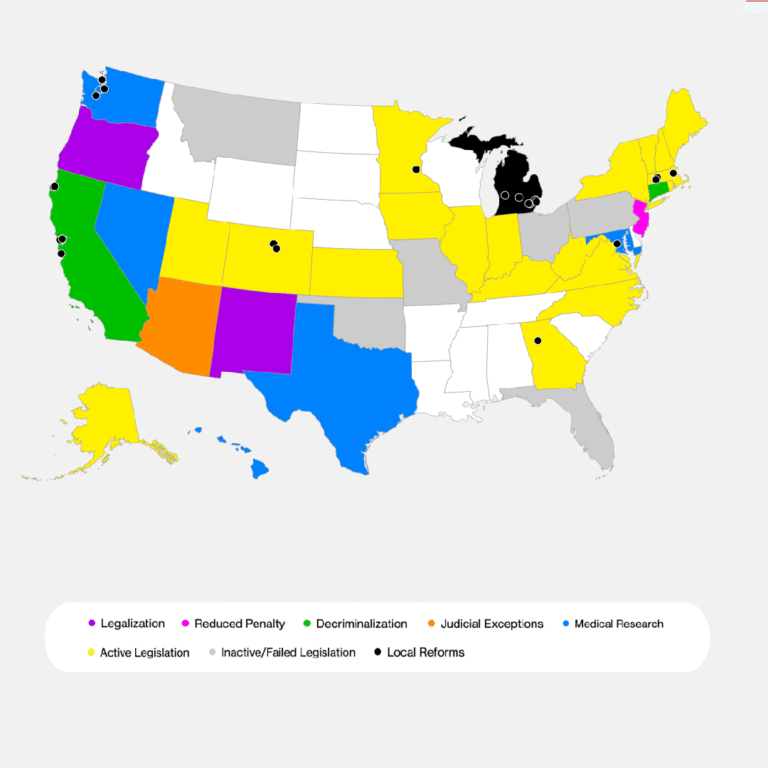After 100 years of propaganda Cannabis could be moved to Schedule-3
From being the “Assassin of Youth” to “Devil’s Lettuce”, a small green plant with its unique leaf shape, Cannabis, has been the target of a century of propaganda that made the general public believe that cannabis was a dangerous, mind-altering drug responsible for all sorts of atrocious crimes. It’s almost needless to say that this ideology would quickly integrate itself with the anti-immigrant ideology, as many Mexican immigrants brought their cultural use of cannabis to the United States (leading to the two versions of its name “Reefer” that could be an etymological change of the Spanish grifo “marijuana, drug addict”, but also could be connected with the sailor slang; in sailing, to “reef” is to roll up the sail — similar to how you’d roll up a joint — and a “reefer” is the sailor who does the rolling.)
Cannabis prohibition, being a portal to racial and social status discrimination, wouldn’t stop in the terminology of “reefer”, according to MPP (Marijuana Policy Project) and ACLU (American Civil Liberties Union), although cannabis use is roughly equal amongst black and whites, African Americans and are over three times more likely to be arrested or cited for cannabis possession as compared to whites.
Additionally, MPP notes that the prohibition did not occur based on science. Instead, it was used against Latinos and black jazz musicians.
The same ideology would remain for the next decades, mainly targeting minority groups and low-income families.
Cannabis prohibition plays a major role in filling our prisons with people of color.
- While African Americans are far more likely than whites to be arrested for cannabis use, rates are about the same across races.
- The federal National Survey on Drug Use and Health found that, in 2014, 49% of whites reported having consumed cannabis at least once in their lifetime. This is compared to 42% of African Americans and 32% of Latinx.
- Two-thirds of all people in state prisons for drug offenses are people of color.
- According to FBI data, half of all drug arrests are for cannabis; of those, 92% are for possession.
- Each year, roughly 6,000 people are deported for cannabis possession.
- Cannabis convictions make it more difficult to obtain housing, jobs, and an education. Since the enforcement of cannabis laws is unequal, Latinx and African Americans are disproportionately affected by this stigmatization.
- More people are arrested for nonviolent cannabis offenses than for all violent crimes combined.
-Source: MPP.org
While still present today by certain generations impacted by propaganda, this ideology is slowly changing in society. As a result, we’ve been witnessing a change in the laws surrounding Cannabis, both in the medical and recreational fields, with Colorado being the first state to legalize recreational Cannabis in 2014, followed by the current progression of 25 states and the District of Columbia also legalizing Cannabis for recreational use, and 40 states legalizing Medical Cannabis programs
Deschedule CANNABIS
Yet, something fairly interesting happens if we check the law on Cannabis today, the plant is still considered a Schedule 1 drug, meeting the criteria of a compound with a high potential for abuse, no currently accepted medical use in treatment in the U.S., and a lack of accepted safety for use under medical supervision, this shows the irony behind those responsible for setting the laws in the United States. Cannabis “has no current accepted medical use in treatment in the U.S”, yet we have Medicinal Cannabis cards and dispensaries.
Given the fallacy on the law-making, HHS recommended that DEA move Cannabis from Schedule 1 to Schedule III based on HHS’ scientific and medical evaluation of the plant.
In May 2024, the DEA proposed to rule that.
This situation was updated this year in a series of interviews on Capitol Hill in October. Dan Sullivan (R-AK), Lisa Murkowski (R-AK), and Kevin Cramer (R-ND) weighed the proposal. In which Trump said in late August would be decided on imminently after endorsing the policy change while campaigning for his second term.
And what could rescheduling mean for consumers and cannabis related businesses?
For consumers:
- Legal Consequences: Marijuana would still be a federally controlled substance, meaning its manufacture, distribution, and possession would still be illegal under the Controlled Substances Act. But the criminal penalties for manufacturing, distributing, and possessing schedule III substances can be less severe than for schedule I substances. Additionally, Congress has prohibited the DOJ from using federal funds to prosecute state-legal medical marijuana activity. As long as Congress continues to do that, such activity is shielded from federal prosecution, and that would be unchanged if marijuana is rescheduled.
- Research: It could become easier for researchers to study marijuana, as research with Schedule III substances is subject to less burdensome DEA requirements compared to Schedule I substances. This might mean that people would have more opportunities to participate in research.
- Drug Development: If pharmaceutical companies are more inclined to develop marijuana-based medications, people may have more options for treatment in the future.
For businesses:
- Tax Benefits: One of the most significant potential changes could be the ability to deduct business expenses on federal tax returns. Currently, under Internal Revenue Code Section 280E, businesses dealing with Schedule I substances cannot deduct these expenses. That said, some tax professionals believe the government is unlikely to forfeit 280E tax revenue and may find other ways to retain it.
- Marketing: If businesses are able to deduct expenses from their federal taxes, marketing efforts and spending could increase, though state policies often heavily regulate advertising.
- Banking Access: While rescheduling might not fully resolve banking issues, it could improve access to financial services. Banks might be more willing to work with cannabis businesses if marijuana is classified as a Schedule III substance.
- Research and Development: While rescheduling won’t change many requirements governing research or allow researchers to source high-THC products from state-legal businesses, demand for research could grow and DEA requirements related to research would be less burdensome.
- Market Expansion: There are multiple interpretations of how rescheduling could affect the market. With reduced legal and financial barriers, some predict growth and expansion, but others predict that rescheduling could lead to more concentration and decreased competition.
- Interstate Commerce: If marijuana is rescheduled or even fully descheduled, other federal laws may still apply, particularly to products distributed interstate (or with components distributed interstate). The U.S. Food and Drug Administration has relevant authorities related to food, dietary supplements, and drugs, which may affect which operators market products and present challenges for small, state-licensed operators.
-Source: Moritz College of Law
But how does the federal rescheduling process work?
The federal rescheduling process is a “formal rulemaking” under the Controlled Substances Act (CSA) that involves several steps:
- Initiating the rescheduling process: The Drug Enforcement Administration (DEA), the Department of Health and Human Services (HHS), or a petition from any interested party, including a drug manufacturer, medical association, or individual person, can initiate the rescheduling process.
- HHS Scientific and Medical Evaluation: Before DEA can propose to reschedule a substance, HHS must provide a scientific and medical evaluation of the substance and its recommendation about what schedule, if any, and the substance should be placed in.
- DEA Notice of Proposed Rulemaking: After receiving the HHS recommendation and if DEA determines rescheduling is warranted under the CSA, DEA publishes a notice of proposed rulemaking in the Federal Register, to propose the rescheduling and invite public comment.
- Public Comment Period: There is a period during which the public can submit comments on the proposed rule. This feedback is considered by the DEA before making a final decision.
- Hearing on the Record: Under the Controlled Substances Act (CSA), any interested party can request a hearing on the proposal.
- Final Rule: After reviewing public comments and conducting any necessary hearing, and if DEA determines the substance should be rescheduled, DEA publishes a final rule in the Federal Register. This rule determines the new scheduling status of the substance.
-Source: Moritz College of Law
What could this mean for psychedelic legislation?
Just like Cannabis, psychedelics, once demonized by propaganda, have recently been proving themselves to be valuable clinical tools for various sorts of mental illnesses, revolutionize anti-inflammatory medicine (we will cover this in a future article), and many other purposes. Leading to a Psychedelic Drug Policy reform, including the decriminalization of psychedelic plants, as we can see in the map below, provided by Psychedelic Alpha.
Such a change in society’s mentality could be what psychedelics were needed to prove themselves even further, not just as recreational compounds used as “Party Drugs”, but as valuable pharmaceutical and research tools for the human mind. For now, the best we can do as a small yet fierce community is to educate the masses, teach them about the various compounds that have never gotten human data, and were unfairly put in Schedule I, and educate people on how they can stop these compounds from being scheduled, allowing researchers to explore them and make new tools to aid us with our health.
Stay safe, stay educated,
Sending love!

